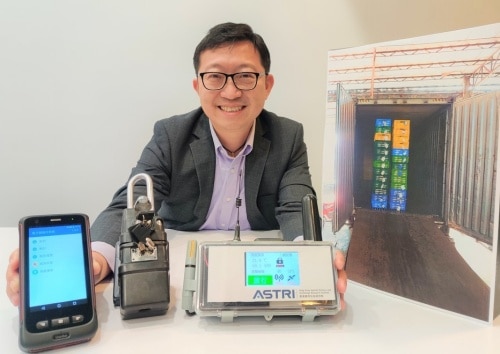The Hong Kong Applied Science and Technology Research Institute (ASTRI) has successfully completed two phases of trial of its newly developed next-generation cold food import safety management platform, which is designed to enhance the monitoring and control of frozen meat imported from Mainland China.
Conducted with the support from Hong Kong’s Food and Environmental Hygiene Department and a meat importer, the trials were done in February and March this year on the routes between a meat processing plant on the Mainland and the Man Kam To Control Point.
ASTRI will optimise the platform, and share the trial results with the relevant departments on the Mainland and in Hong Kong, anticipating further discussions on the development of the platform.
"Our goal is to deploy blockchain and IoT technologies to ensure that the entire process of transporting and storing chilled and frozen food is efficient and hygienic, and to facilitate food traceability. If a food safety incident occurs, we will be able to trace where the problem food comes from and where it goes,” said project coordinator Ricky Leung. Leung is also senior manager of cybersecurity, cryptography and trusted technologies at ASTRI.
Technology-assisted food safety measure
The next generation cold food import safety management platform stores all import documents and container temperature data on the blockchain. Those who have been granted access rights, including farms, processing plants, importers and exporters, and approval units, will share the same documents and data to ensure consistency.
Trucks will use the Global Positioning System (GPS) to record their driving routes and use an advanced electronic lock and thermometer to monitor the status of the container door and the temperature inside, uploading it to the system platform and storing on the blockchain in real time.
Established in 2000 with the mission to enhance Hong Kong's competitiveness through applied research, ASTRI's core R&D competence in various areas is grouped under five technology divisions: AI and big data analytics; communications; cybersecurity, cryptography and trusted technologies; integrated circuits and systems; and IoT and sensors. They are applied across five core areas, including smart city, financial technologies, intelligent manufacturing, digital health, and application specific integrated circuits.
To date, ASTRI has transferred over 750 technologies to the industries and been granted more than 900 patents in the Mainland, the US, and other countries.
“We have always been committed to using advanced scientific research to assist the government and the industrial and commercial sector in addressing problems and optimising operations, thereby improving the quality of life for our citizens,” said Dr Lucas Hui, ASTRI's acting co-CEO and chief technology officer, said.
He added: “With the next generation cold food import safety management platform, we can assist importers and relevant government departments in more efficiently processing food import applications."



